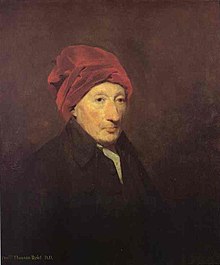Thomas Reid
| Thomas Reid | |
|---|---|

Thomas Reid as painted by Henry Raeburn in 1796
|
|
| Born |
26 April 1710 Strachan, Scotland |
| Died | 7 October 1796 (aged 86) Glasgow, Scotland |
| Alma mater | University of Aberdeen |
| Era | 18th-century philosophy |
| Region | Western Philosophy |
| School |
Scottish Common Sense Realism Scottish Enlightenment |
|
Main interests
|
Metaphysics, epistemology, philosophy of Mind, ethics |
|
Notable ideas
|
Direct realism, epistemological externalism |
|
Influenced
|
|
Thomas Reid FRSE (/riːd/; 26 April 1710 – 7 October 1796) was a religiously trained Scottish philosopher, a contemporary of David Hume as well as "Hume's earliest and fiercest critic." He was the founder of the Scottish School of Common Sense and played an integral role in the Scottish Enlightenment. The early part of his life was spent in Aberdeen and he graduated from the University of Aberdeen. He began his career as a Minister of the Church of Scotland but ceased to be a Minister (or called 'Reverend') when he was given a professorship at King's College, Aberdeen in 1752. He obtained his doctorate and wrote An Inquiry Into the Human Mind on the Principles of Common Sense (published in 1764). He and his colleagues founded the 'Aberdeen Philosophical Society' which was popularly known as the 'Wise Club' (a literary-philosophical association). Shortly after the publication of his first book, he was given the prestigious Professorship of Moral Philosophy at the University of Glasgow when he was called to replace Adam Smith. He resigned from this position in 1781, after which he prepared his university lectures for publication in two books: Essays on the Intellectual Powers of Man (1785) and Essays on the Active Powers of the Human Mind (1788). Reid was buried at Blackfriars Church in the grounds of Glasgow College and when the university moved to Gilmorehill in the west of Glasgow, his tombstone was inserted in the main building. See separate article on Thomas Reid's tombstone.
...
Wikipedia
